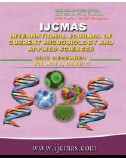


 National Academy of Agricultural Sciences (NAAS)
National Academy of Agricultural Sciences (NAAS)

|
PRINT ISSN : 2319-7692
Online ISSN : 2319-7706 Issues : 12 per year Publisher : Excellent Publishers Email : editorijcmas@gmail.com / submit@ijcmas.com Editor-in-chief: Dr.M.Prakash Index Copernicus ICV 2018: 95.39 NAAS RATING 2020: 5.38 |
The present investigation was aimed to study the effect of vitamin C on electrolyte concentrations in blood and urine in water deprived goats during summer and winter seasons. Eighteen adult male goats were selected for the experiment during both seasons.In each season, there were two treatment groups: T1 and T2 group. In T1 group, water was restricted and subdivided into three experimental periods: in period 1 (day 1 to 7), goats were adapted to the water restriction regime by limiting access to water gradually from 15 to 3 hour per day. During the second period of the experiment (day 8 to 14), animals had access to water for 3 hours/day. In the final period of the experiment (day 15 to 22), animals had access to water only every second day for 6 hours. In T2 group, the same protocol as mentioned above was followed with addition of vitamin C supplementation (180 mg/kg body weight/animal/day). In the control group (both season), water was offered ad libitum (24 hours) throughout the experimental period. Blood and urine samples were collected and concentrations of different electrolytes were estimated. In T1 group, serum and urine sodium, potassium and chloride levels showed increasing trend (P<0.05) in both seasons.Urine sodium and chloride concentrations showed increasing trend up to day 22 in both seasons in T2 group; whereas, potassium concentration showed similar trend from day 7 during winter season, but during summer concentration increased up to 7 day, then decreased. Significantly lower (P<0.05) serum and urine electrolyte values were observed in vitamin C supplemented group as compared to water deprived group in last days (14 and 22 day) of experiment.The overall summer value of serum sodium and chloride were higher as compared to overall winter values in all the groups; whereas, overall summer value of potassium was higher only in control group as compared to winter season.Overall summer value of urine sodium was higher in all groups, significant variation found in T2 group. Overall potassium concentrations in urine was significantly higher (P<0.05) in T1 in summer. Summer chloride concentrations in urine were higher in treatment groups; whereas, lower in control.Water deprivation had negative impact on electrolyte balance, which can be ameoliorated by supplementation of ascorbic acid at the rate of @180mg/kg b.wt./day.
 |
 |
 |
 |
 |